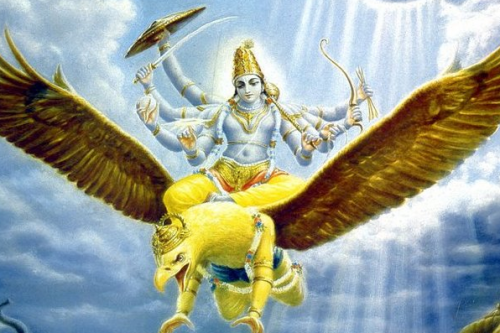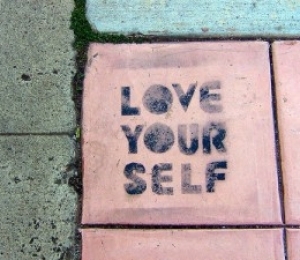
Published by Josh Blatter––The 32 Metronome Project | March 4, 2014
The lessons of Garuda
As Garuda extolled in the magnificence and beauty of the little bird, Yama, the Hindu god of death, rode by on his ox. Yama looked at the little bird (in which Garuda marvelled) and the bird looked back at him unaware of its insinuation. Yama rode on. Garuda, upset by the foreshadow of the birds encounter with death, ran over to the bird, swooped it up and flew it a thousand miles away [in Hindu myth Garuda is part man, part eagle, capable of traveling long distances at lightening speed]. Garuda left the bird on a large rock near a stream, freeing it from the jaws of death. Garuda parted his ways with the little bird and flew back just in time to catch Yama on his return home.
“YAMA, MAY I ASK YOU A QUESTION?” GARUDA YELLED ACROSS THE WAY.
“YES,” HE REPLIED.
“WHY DID YOU LOOK SO PERPLEXED STARING AT THAT POOR LITTLE BIRD EARLIER TODAY?” INQUIRED GARUDA.
“BECAUSE WHEN I LOOKED INTO THE BIRDS EYES I SAW ITS DEATH. IT WAS EATEN BY A PYTHON A THOUSAND MILES AWAY ON A ROCK, BY A STREAM. I HAD NO IDEA HOW THAT LITTLE BIRD TRAVELED SUCH A LONG DISTANCE. SO I KEPT WALKING,” YAMA ANSWERED, WITH A CROOKED SMILE.
The unpleasant outcome to this tall tale, may seem to the enet ear, slightly unfavorable. There is no Cinderella ending for the innocent little bird or an Oscar winning denouement. However when we take a step back we can see a much greater lesson to be learned – I think Aesop would have been proud. Life, whether we choose to admit it, will come to an end at some point. This is a universal truth. In the moments of loss, whether it be as sizable as a human life, a beautiful bird, or something more paltry, there is a natural suspension of happiness and heartfelt reverence. The feelings of despair are often accompanied by hindsight self-reflections on what we could have done differently. But I pose the question: is it our livelihood to do differently?
It is not our job to fix others’ problems – regardless of how large or small the order. It is important to note that I am not speaking of dharmma. A mother’s dharmma is to help her children, a doctor’s dharmma is to heal patients, a therapist’s dharmma is to provide perspective, so on and so forth. Hear me out because I am not advocating narcissism or self-serving delusion and I especially don’t want to encourage separation. I want to deploy something greater; to emphasize the importance that we take a look at our role in any situation and ask the questions. Why is it that I feel the need to help? What is my motive? Is this my responsibility?
When we boil it down and deduce these questions, our decisions comes from one of two places. The first one is an inner knowing. It is a feeling deep within that has a sharper edge than a rational thought. It is not formulated by patterns we spent our life perfecting or derived from negotiation. There is usually no past experience linked because it is a more instinctual choice. I think it is best stated in the title of my friend David Howitt’s new book, “HEED YOUR CALL.” – it is answering the phone.
The alternative to coming from our gut is to come from identification. Patanjali calls it asmita or i-ness. A driver’s license is a robust metaphor for identification. It is a tangible symbol that we can all relate to. It has our full name, a mug shot (if you have to go to the DMV in Southern California), and a brief description of our features, height, weight, eye color, etc. It depicts a pretty sound portrait of the sense of I. Now image that the drivers license also contained a confession of our innate tendencies. What if in addition to our physiological features it said: I fear *blank*, I need *blank*, I thrive on *blank*, I am important to *blank*, etc. This is scarily not far from the way we illustrate ourselves.
If we choose to use our driver’s license to define ourselves, the results of our actions will be like the outcome of Garuda and the decisions we make will come from the wrong place. We will act out of fear instead of indifference, do things to please others while sacrificing ourselves and become burdened by the ebb and flow of temporal pleasure. Instead of taking soft action, we end up grasping and clinging to what we have seen and avoiding the mistakes we have made in the past.
Garuda decided to help the little bird because he was enamored by its beauty. On an existential level it was the loss of the beauty that negotiated his actions, not the birds life. Would he have done the same thing if it was a hairy rat? Clinging to what we adore in fear of losing it is calledattachment and it is a way in which we identify. Why do we eat the foods we eat? Why do we dress the way we dress? Why do we read the things we read? It is because something in the past has resulted in a positive emotional charge that we yearn to recreate. As humans we thrive for the known. The antithesis of attachment is aversion. Aversion is the other type of identification where we avoid things that had caused us pain. Whenever our actions stem from identification (attachment or aversion), we are coming from a place bound by suffering and if you can’t resonate with the strength of the word suffering you can use frustration.
When we are not defining ourselves by what our driver’s license says, we are coming from the inner voice. You can call it your gut, God, gods, soul, spirit, or whatever settles to you. This place is unwarranted by patterns. It is HOW we “heed our call.” It is a scary place because it is unfamiliar. It requires a tremendous amount of trust and self-compassion. The inner voice is predicated on sensitivity and kindness because the immediacy of the outcomes are not always favorable. HOWEVER, there is no residue or regret. Regret is like the what-ifs. It is much more biting than simply not getting your needs met. It is a lasting odor that is the bi-product of making decisions based on identification. When we still the mind that clings to familiarity, learn to detach from the outcome and culminate trust, the capacity of our system to recognize the different sources of our actions become refined.
The example I like to use is of a job interview. Two college graduates apply for a job at a law firm; both of which studied hard in college, received high marks, practiced their interviewing skills and polished their resume. A few days before their interviews both received an email stating that there were 50 candidates applying for the same position, half of which were already practicing lawyers. The first graduate decided not to show up, believing that his odds were too slim. The second graduate showed up for the interview, interviewed well, but was under qualified for the position. Neither of the two got the job. What is the difference? Although both were guided to the job by their instinct only one allowed fear to get in the way. The identification of failure was so strong that it jettison the inner voice and that person alone will suffer – even though neither got the job.
Regret or what-ifs are a very sour taste. They will make you cringe, turn your head and squeeze your eyelids shut. We all can identify with what sour feels like and even though it may not discern as satiating, it is not uncommon to go back for more. In fact, we need sour as part of the full spectrum of tastes. Just like we need identification, attachment and aversion on some level. To ignore or deem them nonexistent would not serve us justice either because neither are innately bad. Attachment toward a healthy diet is good. Aversion toward spiders in a jungle is natural. Craving healthy food to the extent that you starve yourself is a problem. Being scared of spiders all the time is not good. It is only when the pattern begins to take over that we are led toward pain.
The solution is to bring more awareness to our actions. Yoga, meditation, and other grounding practices allow for this cultivation of clarity. When we do the self reflection, look at ourselves openly and do so compassionately, then we know that whatever decision we make will not leave a bad taste in the mouth. Garuda’s job was not to fix the bird’s problem but I think we all can relate to what he did. When we extract the inner voice from the outer, it will take us far in life – beyond our wildest dream.










